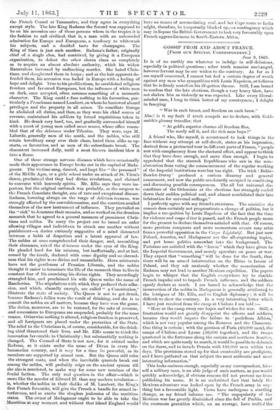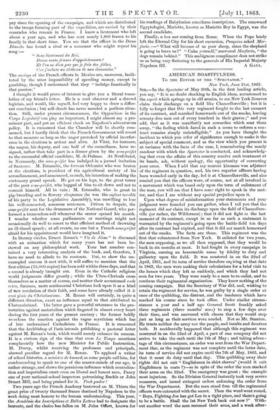GOSSIP FROM AND ABOUT FRANCE.
[FROM OUR SPECIAL CORRESPONDENT.]
.Tune 9, 1863. IT is of no earthly use whatever to indulge in self-delusions, especially in political questions ; sober truth remains unchanged, however fervent may be our wishes to the contrary. As far as I am myself concerned, I cannot but feel a certain degree of wrath against any man who sympathizes with Louis Napoleon, or believes that he is firmly seated on his ill-gotten 'throne. Still, I am bound to confess that the late elections, though a very heavy blow, have not shaken him as violently as was expected. Like every liberal- minded man, I long to think better of my countrymen ; I delight in fancying
"War in each breast, and freedom on each brow."
Alas ! is it my fault if truth compels me to declare, with Gold- smith's gloomy traveller, that "At gold's superior charms all freedom flies, The needy sell it, and the rich man buys ?"
A friend who, like myself, is accustomed to look things in the face without any attempt at self-deceit, states as his impression, derived from a protracted tour in different parts of France, "people rest with complacency from the electoral effort, and appear to think that they have done enough, and more than enough. I begin to apprehend that the staunch Republicans who saw in the non- abstention from voting the commencement of the regular working of the Imperial institutions were but too right. The trick Bdhic- Boudet-Durny ' produced a curious disarray and general amazement, and now the public are daintily occupied in combining and discussing possible consequences. The all but universal dis- comfiture of the Orleanists at the elections has strangely cooled down their sudden political zeal, and almost annihilated their late infatuation for universal suffrage."
I perfectly agree with my friend's strictures. The minisare des commis does certainly not prognosticate a change of politics, but it implies a recognition by Louis Napoleon of the fact that the time for violence and coups (Vital is passed, and the French people mean for the present to declare themselves satisfied with that. Of course, more precious conquests and more momentous events may arise from a powerful opposition in the Corps J4islatif. But just now Poland, America, and Madagascar are the all-engrossing topics, and put home politics somewhat into the background. The Parisians are satisfied with the " lesson " which they have given to the Imperial Government, and merely speculate on peace or war. 'They expect that " something " will be done for the South, that there will be an armed intervention on the Rhine in favour of Poland, and they ask anxiously whether the assassination of Radama may not lead to another Mexican expedition. The papers begin to whisper that the English everywhere try to shackle French impulse and to impede French influence, and the soldiers openly declare as much. I am bound to acknowledge that the insurrection of the nobles in Madagascar is generally attribute 4 to the intrigues of Mr. Ellis, and to English diplomacy ; it will be difficult to show the contrary. In a very interesting letter which I have just received from the camp at Chalons I am told :— "Here at the camp every one hopes and wishes for war. Still, a frustration would not greatly disappoint the officers and soldiers, because they would impute the failure to 'perfidious Albion,' which is not very popular among the Zouaves and the Chaeseurs. One thing is certain ; with the garrison of Paris (60,000 men), the camps of Chalons and Lyons (50,000 together), and the troops quartered in the fortresses along the eastern and northern frontier, and which are quite ready to march, it would be possible to debouch on the Sarre, and to invade Prussia with 150,000 men within ten days. The provisions stored up for that eventuality are prodigious, and I have gathered on that subject the most authentic and most interesting information."
This looks ominous enough, especially as my correspondent, hire- self a military man, is an able judge of such matters, as you would quickly acknowledge, if obvious reasons did not prevent me from publishing his name. It is an undoubted fact that lately the Mexican adventure was looked upon by the French army in any- thing but a favourable light. Views have undergone a startling change, as my friend informs me. "The unpopularity of the Mexican war has greatly diminished since the fall of Puebla, and the enormous gratuities which, on an average, have trebled the
pay since the opening of the campaign, and which are distributed to the troops forming part of the expedition, are envied by their comrades who remain in France. I know a lieutenant who left about a year ago, and who has sent nearly 1,800 francs to his family in that short time. You see that the officer in the Dame Blanche has found a rival or a successor who might repeat his song :— " Sous lieutenant du Roi,
Douze cents francs d'appointements !
Et l'on as (lira pas que je fais des folies, Car j'achete un château de mes Icononzies."
The savings of the French officers in Mexico are, moreover, facili- tated by the utter impossibility of spending money, except in gambling, though I understand that they "indulge frantically in that passion."
I thought it would prove of interest to give you a literal trans- lation of my friend's letter. He is • a cool observer and a shrewd logician, and would, like myself, feel very happy to draw a differ- ent conclusion ; but self-deceit has never mended a perilous situa- tion. Still, under present circumstances, the Opposition in the Corps Legislatif can play an important, I might almost say a pro- minent part, and put an efficient check on Napoleon's adventurous policy. It is rumoured that the Chamber will be shortly sum- moned, but I hardly think that the French Government will resort to that measure as long as the anger provoked by official interfer- ence in the elections is ardent and alive. At Yard, for instance, the mayor, his deputy, and one half of the councilmen, have re- signed, rather than take part in a dinner given by the sons-p7Vet to the successful official candidate, M. de Dalmas. At Neufchatel, in Normandy, the sons-pr get has indulged in a jocund imitation of Santerre. M. Estanalin, the fervent Orleanist who was beaten at the elections, is president of the agricultural society of his arrondissement, and announced, as such, his intention of making the customary grand speech. He got on his legs, to the great terror of the poor sous-prVet, who begged of him to sit down and not to commit himself. All in vain ; M. Estanalin, who is great in pig-breeding and in flowery eloquence (he was the enfant terrible of his party in the Legislative Assembly), was unwilling to lose his well-concocted, sonorous sentences. Driven to despair, the sous-prifet sent for the drummers of the National Guard, who per- formed a tremendous roll whenever the orator opened his mouth. I wonder whether some parliaments or meetings might not occasionally do well to resort to that efficient method of drowning an ill-timed speech ; at all events, no one but a French sous-pr4fet afraid for his appointment would have imagined it.
In literary circles, Ernest Renan's " Vie de Je'sus" is discussed with an animation which for many years has not been be- stowed on any philosophical work. Your last number con- tained a very interesting analysis of the book, and, therefore, I have no need to allude to its contents. But, to show the an- exampled success it met with, it will suffice to mention that the first edition (15,000 copies) has been sold within three days, and that a second is already brought out. Even in the Catholic religious world judgments differ greatly ; while the Ultra-Clericals cross themselves as a matter of course, and mutter their accustomed mule, retro, Satanas, more sentimental Christians look upon it as a kind of stew revelation of their faith, and some have already called it le m-ai genie du Christianisnze. M. Renan will certainly, in quite a different direction, exert an influence equal to that attributed to Chateaubriand. 'The latter gave a powerful utterance to the pro- testation against materialism which lingered in almost every heart during the first years of the present century ; the former boldly re-echoes the reaction against the vague mysticism which has of late undermined Catholicism in France. It is rumoured that the Archbishop of Paris intends publishing a pastoral letter against M. Renan's book, which would merely enhance its success. It is a curious sign of the time that even Le Temps mentions complacently how the new Minister for Public Instruction, M. Duruy, whilst receiving the professors and principals, showed peculiar regard for M. Renan. To applaud a writer of school histories, a nzinistre de hazard, as some people call him, for condescending to speak to one of the master-minds of our age, is rather strange, and shows the pernicious influence which centraliza- tion and imperialism exert even on liberal and honest men. Fancy one of your national-school inspectors patronizing Buckle or John Stuart Mill, and being praised for it. Proh pudor !
Two years ago the French Academy bestowed on M. Thiers the
great prize of twenty thousand francs destined by Napoleon to the work doing most honour to the human understanding. This year, the Academie des Inscriptions et Belles Lettres had to designate the laureate, and the choice has fallen on M. Jules Offert, known for
his readings of Babylonian cuneiform inscriptions. The renowned Egyptologist, Mariette, known as Marlette Bey in Egypt, was the second candidate.
Finally, a bon mot coming from Rome. When the Pope lately left the Eternal City for his short excursion, Pasquino asked Mar- fario :—" What will become of us poor sheep, since the shepherd is going to leave us?" "Calm yourself," answered Morfario, " the- dogs remain behind." This ambiguous compliment does not strike us as being very flattering to the generals of His Imperial Majesty




































 Previous page
Previous page